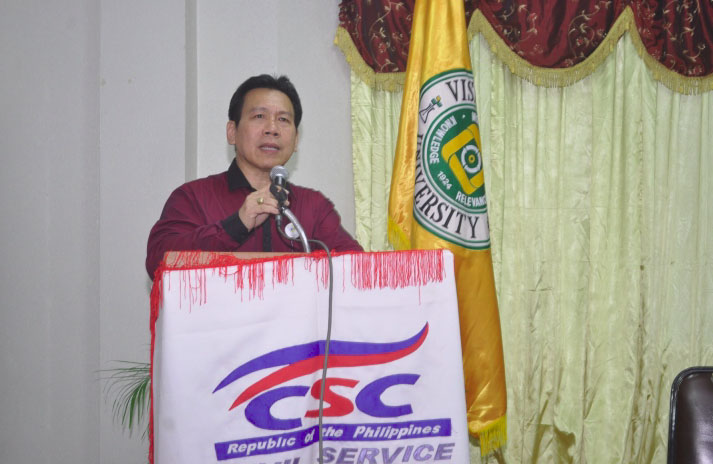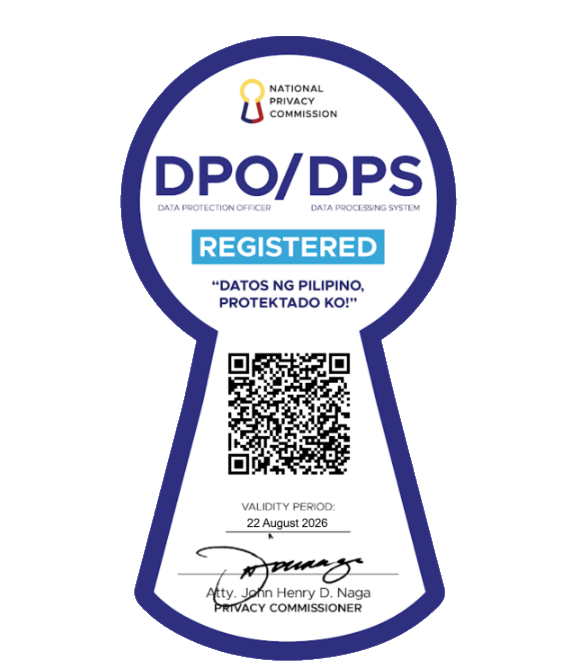CSC personnel conduct EHEM seminar to VSU heads
- Details
-
Published: 30 August 2013

Some officials from the Civil Service Commission (CSC) led by Atty. David E. Cabanag, Jr., Assistant Commissioner of CSC, responded to the invitation of the Visayas State University for the conduct of EHEM! Anti-Corruption Sensitivity Workshop held on February 7-8, 2013 at the VSU's Center for Continuing Education.
Participated in by some 42 officials of the University System—composed of the president, vice presidents, deans, heads of the different offices/departments, and other officials—the two-day workshop aimed to: 1) facilitate a process among various sector towards understanding the culture of corruption, its various standpoints, and the roles of individuals and institutions in the perpetuation of corruption in Philippine society; 2) provide an avenue for analyzing issues and situations of corruption, and their immediate and long-term causes and consequences; 3) allow serious reflection among participants to generate insights on their value systems that reinforce or prevent corruption; and 4) build commitment and formulate plans to help combat corruption.
In his message during the opening program, Dr. Jose L. Bacusmo, VSU President, emphasized that after the training, the participants will be more outspoken when it comes to seeing someone doing corruption to make other guys realize that somebody is watching them. The VSU President pointed out that corruption is not only about money but it is about justice. "Not giving what is due to our clients/students, not teaching them when they are supposed to get lessons from us when they are supposed to attend classes, and not coming on time are just few of corruption practices that sometimes we tend to neglect," Dr. Bacusmo stressed.
He even simplified his explanation of what 'graft' is all about. According to the VSU President, 'graft' is just like a union of root stock and the scion from the same plant family that resembles with the fusion of personal agenda with the official agenda, personal needs and the official needs—which simply means "grafting."
He further said that the activity is part of VSU's quest for the Seal of Excellence under PRIME HRM of the CSC. "We have trail-blazed in the academic side, and now is the right time for us to focus on the administrative side by passing the Center of Excellence and later on the Seal of Excellence," the VSU President averred.
The workshop tackled four modules in the EHEM process which were discussed thoroughly by the resource persons.
Module I – "Experience" was presented by Ms. Eleonor B. Garcia, Chief Personnel Specialist of Human Resource Division of CSC 8. This module provided an opportunity to the participants by immersing themselves into the reality exercise on the problem of corruption. It enabled them to get a feel of the reality of corruption in their personal and social life, identify the different roles people play in relation to corruption and the possible reasons for their involvement, appreciate the value of people's intervention and heroic acts against corruption, and arrive at a clearer understanding of corruption.
To have a deeper understanding of what corruption is all about, the participants were asked about their own perception of corruption. They were made to understand fully the meaning of corruption, types and categories of corruption, state of corruption in the Philippines, and presented the most corrupt agencies in the Philippines.
Ms. Garcia elaborated on the meaning of "Ehem" which is a gesture to grumble, a gentle but powerful sound to caution and make one's presence known, a nondidactic but confrontational signal that calls attention, a guttural pitch that deters or discourages, a subtle but effective signal that reminds one to be vigilant, and a very compact word that warns.
On the other hand, Mr. Lysander G. Navales, CSC Director II based in Southern Leyte Field Office, elaborated Module II – "Analysis". The module enabled the participants to gain insights and clear understanding of the causes and consequences of corruption, be bothered by the extent of its effects, and go through a process of value clarification of one's attitudes and responses to forms of corruption.
The training was highlighted with a sensitivity workshop facilitated by Atty. Cabanag wherein the participants were called to dinner with the following mechanics: eat your food, no communication, listen to advice, and follow instruction. After they got their food, some participants had eaten their food right away without anticipation that the facilitator would make another instruction, saying "Eat the food, but remember that the food that you get is not your food," which he repeatedly said while the participants were having their dinner.
Varied ideas popped-up during the reflection of the sensitivity workshop facilitated by a sensible and well-prepared moderator.
Atty. Cabanag vividly discussed Module III – "Reflection" that brought the participants into a serious reflection and a cultural value system that reinforce and perpetuate corruption as well as the personal rules and involvement in the commission or prevention of corruption. He also presented the five A's of reflection and commitment, such as: 1) Assess your concrete situation, 2) Accept your share of responsibility, 3) Awaken your noble desires, 4) Align your values with citizenship, and 5) Act with competence and hope.
The topic was reinforced with role playing activities during the vulnerability workshop wherein the participants were grouped into four and presented some cases where individuals could be vulnerable to graft and corruption.
Finally, Module IV – "Action" was discussed by Mr. Michael N. Dela Cruz, CSC Director II based in Biliran Field Office with Western Leyte Satellite Office. The session provided an opportunity for the participants to get involved and formulate action plans to combat corruption.
The different modules were presented by the resource persons through lectures-discussions, group exercises and activities.


